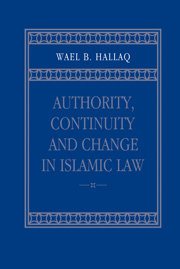Book contents
- Frontmatter
- Contents
- Preface
- 1 Juristic typologies: a framework for enquiry
- 2 Early ijtihād and the later construction of authority
- 3 The rise and augmentation of school authority
- 4 Taqlīd: authority, hermeneutics, and function
- 5 Operative terminology and the dynamics of legal doctrine
- 6 The jurisconsult, the author–jurist, and legal change
- Summary and conclusions
- Bibliography
- Index
6 - The jurisconsult, the author–jurist, and legal change
Published online by Cambridge University Press: 27 July 2009
- Frontmatter
- Contents
- Preface
- 1 Juristic typologies: a framework for enquiry
- 2 Early ijtihād and the later construction of authority
- 3 The rise and augmentation of school authority
- 4 Taqlīd: authority, hermeneutics, and function
- 5 Operative terminology and the dynamics of legal doctrine
- 6 The jurisconsult, the author–jurist, and legal change
- Summary and conclusions
- Bibliography
- Index
Summary
It is not our primary concern here to show that Islamic law underwent change at diffierent points in its history or in particular regions under its jurisdiction, although there is sufficient justification to do so in light of the fact that modern Islamicist scholarship has, until recently, categorically denied that it experienced any noticeable, much less fundamental, development after the formative period. Instead, and going beyond the narrow confines of this issue, we will focus on explaining how change took place and who were the agents of this process. For in explaining the modalities of legal change, one can at the same time demonstrate, a fortiori, that not only did change take place but also that its means of accommodation were a fundamental, and indeed a structural, feature of Islamic law.
Before we proceed any further, a preliminary but important remark is in order; namely, that Muslim jurists and Islamic legal culture in general not only, as we shall see, experienced legal change in very concrete terms but were also aware of change as a distinct feature of the law. A society (or an individual, for that matter) may experience a certain phenomenon and even partake in it actively, yet may nevertheless fail to articulate the experience consciously and may thus remain unaware of the processes taking place and in which it is involved. This certainly was not the case with legal change in Islam.
- Type
- Chapter
- Information
- Authority, Continuity and Change in Islamic Law , pp. 166 - 235Publisher: Cambridge University PressPrint publication year: 2001



